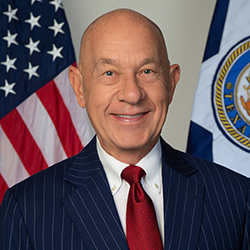Houston senior police officer Matthew Davis’ annual salary was about $90,000 this past fiscal year. He made nearly $170,000 more in overtime.
It was not an anomaly. Davis has collected more in overtime than his base salary every year since at least 2020, and was previously disciplined for participating in an overtime scheme involving fabricated witness claims on traffic tickets. He is part of a growing pattern among the city’s highest-paid traffic enforcement officers who routinely collect overtime earnings that match or exceed their base salaries, a Houston Chronicle analysis found.
Houston police’s overtime spending, which has been growing for years, reached a new high of $74 million this fiscal year, which ran from May 2024 to April 2025. That’s up 26% from the previous fiscal year and eclipses the city’s police overtime budget of about $45 million.
The overtime surge is largely driven by the department’s traffic enforcement division and stems, in part, from a basic scheduling conflict: traffic officers tend to work afternoon and evening shifts when traffic – and traffic violations – peak, then must appear in court in the mornings to testify about the tickets they issued.
Over the past five fiscal years, seven out of the 10 highest police overtime earners worked in traffic enforcement and, together, banked a whopping $3.5 million in overtime alone. Citation records obtained by the Chronicle for Davis, one of the seven, show he devoted a large part of two workdays every week to court activities.
In what could compound the issue, a new contract approved by Houston City Council for the department’s more than 5,200 officers doubled the minimum overtime pay for court appearances from two to four hours. That means police that show up to court will earn at least four hours of overtime even if they only spend 10 minutes at the courthouse.
Officials with the Houston Police Department didn’t respond to a request for comment about their use of overtime funds. The agency declined to make Davis available for an interview.
“We won’t protect public safety by compromising financial safety,” City Controller Chris Hollins said of the police department’s overtime woes.
The police department’s overtime spending consistently surpasses budget projections and underestimates those costs again in the upcoming fiscal year, Hollins said.
“It’s time to invest in smarter workforce planning, more accurate forecasting and better fiscal discipline across the board,” he said.
Houston police leaders can control some aspects of overtime spending, by managing schedules and hiring more officers full-time, but some budget issues are outside of their direct control, said Doug Griffith, president of the Houston Police Officers Union. And the 2026 fiscal year, which will include major events like the 2026 FIFA World Cup, looks to be an expensive year for overtime spending.
“Just wait until next year with FIFA and it being 21 days,” Griffith said. “If you don’t think there’s going to be a ton of overtime spending during that event, you’re sadly mistaken.”
Traffic enforcement and staffing for major events are inherently expensive types of policing, Griffith said. And it’s hard to budget for them, because so much of it comes via state and federal initiatives and at the request of the mayor and individual councilmembers.
Mayor John Whitmire, for instance, has talked publicly about how more traffic enforcement will be a priority moving forward. And traffic officers have already written more than 1,000 citations as part of highly-publicized one- and two-day operations on the city’s roadways.
It’s a long story and that’s a gift link, so read the rest. Just a couple of high-level thoughts:
– One way or another, we have to get this cost under control. I’d take the Mayor’s entire “root out waste” schtick more seriously if he put a higher priority on stuff like this. His answer is to hire more cops, in part by paying them a lot more, but that neither addresses the scheduling issues for traffic patrol cops nor fixes things in the short term. Given that 2026 is going to be a big year for this kind of spending, what are we going to do about that?
– One thing we could do is crack down on cops who abuse the overtime system, as documented in the story. That sort of thing should not only be a firable offense, it should be potentially a criminal offense. I feel like that would go a long way, but I doubt there’s anything in the collective bargaining agreement or in this Mayor’s DNA that would allow for that. Demanding that HPD be more efficient just isn’t in the cards.
– We absolutely do need traffic enforcement, as anyone who has marveled at the lunacy of too many drivers in this town can attest. But much of what we get are speed traps that to my mind have limited usefulness. And in the meantime, we’re prioritizing vehicular speed in our road designs over safety, which just makes no sense at all.
– What most of this comes down to for me is the concern that there’s no mechanism in place to enforce reasonable spending controls at HPD, ones that put a premium on high-value work like clearing cases. And we’re not getting something like that anytime soon.

